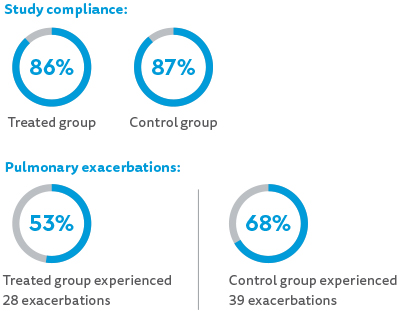Key takeaways
-
This mouse model research found a difference in liver B-cell composition, with a transition to a more mature and activated innate immune cell phenotype.
-
Activation of T-cells and macrophages by B-cells occurs independent of antigen presentation.
-
B-cells in the biliary atresia liver are most likely participating in the inflammatory process through increased production of pro-inflammatory cytokines.
Research background: Can multivitamins help cystic fibrosis patients?
Chronic bacterial infections are common in patients with cystic fibrosis (CF). The infections lead to inflammation and the release of vast amounts of reactive oxygen species in their airways. Healthy bodies mount an antioxidant defense to neutralize oxidant stress, but CF is characterized by dietary antioxidant deficiencies. This contributes to an oxidant-antioxidant imbalance and more inflammation, which can cause lung damage and a progressive loss of lung function.
The pancreas of a person with CF does not produce enough digestive enzymes and diminished bile acids, causing malabsorption of important dietary antioxidants, including carotenoids such as b-carotene, tocopherols (vitamin E), coenzyme Q10 (CoQ10) and selenium.
Dietary antioxidant deficiencies have been repeatedly demonstrated in individuals with CF, particularly in those with pancreatic insufficiency, despite treatment with pancreatic enzymes and CF-specific multivitamin supplements. Increased reactive oxygen species in combination with deficient antioxidant concentrations result in an oxidant–antioxidant imbalance and oxidative stress in CF.
Developing safe and effective anti-inflammatory treatments is a key priority of the CF community. Lead Author Scott Sagel, MD, PhD, director of the Mike Morris Cystic Fibrosis Research and Care Center at the Breathing Institute at Children's Hospital Colorado, along with other researchers, sought to determine the effects of an oral antioxidant-enriched multivitamin supplement on antioxidant concentrations, markers of inflammation and oxidative stress, and clinical outcomes.
Research methods: Study participants took cystic fibrosis multivitamins with or without antioxidants
Coordinated by the CF Foundation Therapeutics Development Network, this randomized control trial took place between September 2013 and October 2015 at 15 accredited CF care centers across the United States.
CF patients with pancreatic insufficiency who were at least 10 years old and had FEV1 between 40% and 100% predicted were eligible to participate. (The forced expiratory volume in one second (FEV1) measurement shows the amount of air a person can forcefully exhale in one second of an FVC test.)
The trial included four study visits. After the screening visits, participants discontinued their current vitamin supplement and took a control multivitamin without antioxidant enrichment. At the second visit (baseline), patients were randomized and either received the antioxidant enriched multivitamin or the control multivitamin (control group).

Participants received a fasting blood draw for antioxidant and vitamin concentrations and markers of inflammation and oxidative stress, anthropometric measures, and pulmonary function at baseline and at four and 16 weeks. They were instructed to hold their vitamin formulations and fast for at least eight hours before study visits and blood draws. Specimens were collected at baseline and week 16 for markers of inflammation and oxidative stress.
The primary endpoint was the difference between treatment groups in the change in sputum myeloperoxidase (MPO) from baseline to week 16. Secondary endpoints included change from baseline to weeks four and 16 in systemic antioxidant concentrations, systemic and sputum markers of inflammation and oxidative stress, vitamin levels, change from baseline in FEV1 percent predicted, weight, BMI, time to first protocol-defined pulmonary exacerbation, and number of exacerbations.
Research results: Patients who took cystic fibrosis supplements with antioxidants had fewer pulmonary exacerbations


Although the hospitalization event rate was lower in the treated group, it was not significantly different compared with the control group. In addition, no significant differences between groups were observed for absolute or relative changes of FVC and forced expiratory flow in the midexpiratory phase, or for 16-week change in weight or BMI. At baseline, circulating antioxidant and vitamin concentrations and incidence of adverse and serious adverse events was similar between the two groups; all serious adverse events were deemed unrelated to study treatment.
The change in sputum MPO over the 16-week treatment period was not significantly different between groups, thus the primary endpoint was not met.
Research discussion: Cystic fibrosis multivitamin supplements with antioxidants prolonged the time to first respiratory illness
The antioxidant-treated group had a significantly lower risk of first pulmonary exacerbation requiring antibiotics than the control group. The researchers also found that supplemental antioxidants increased circulating antioxidant concentrations of beta-carotene, coenzyme Q10, gamma-tocopherol (a form of vitamin E) and lutein and transiently decreased inflammation (at 4 weeks, but not 16 weeks) as measured by two blood-based biomarkers of inflammation, calprotectin and myeloperoxidase (MPO).
Optimizing antioxidant status in CF is an important clinical goal. While the antioxidant supplement did not appear to exert sustained anti-inflammatory effects, study authors believe its effect on time to first pulmonary exacerbation was significant and clinically meaningful and that the antioxidant supplement offers a simple, relatively inexpensive means for restoring normal antioxidant levels in patients with cystic fibrosis.
Refer a patient
The Mike McMorris Cystic Fibrosis Center in the Breathing Institute at Children's Colorado is one of the premiere CF clinical care and research centers in the country. Contact us at 720-777-6181 or cysticfibrosis@childrenscolorado.org.
Featured Researchers

Scott Sagel, MD, PhD
Pulmonologist
Children's Hospital Colorado
Professor
Pulmonary Medicine - Department of Pediatrics
University of Colorado





 720-777-0123
720-777-0123










